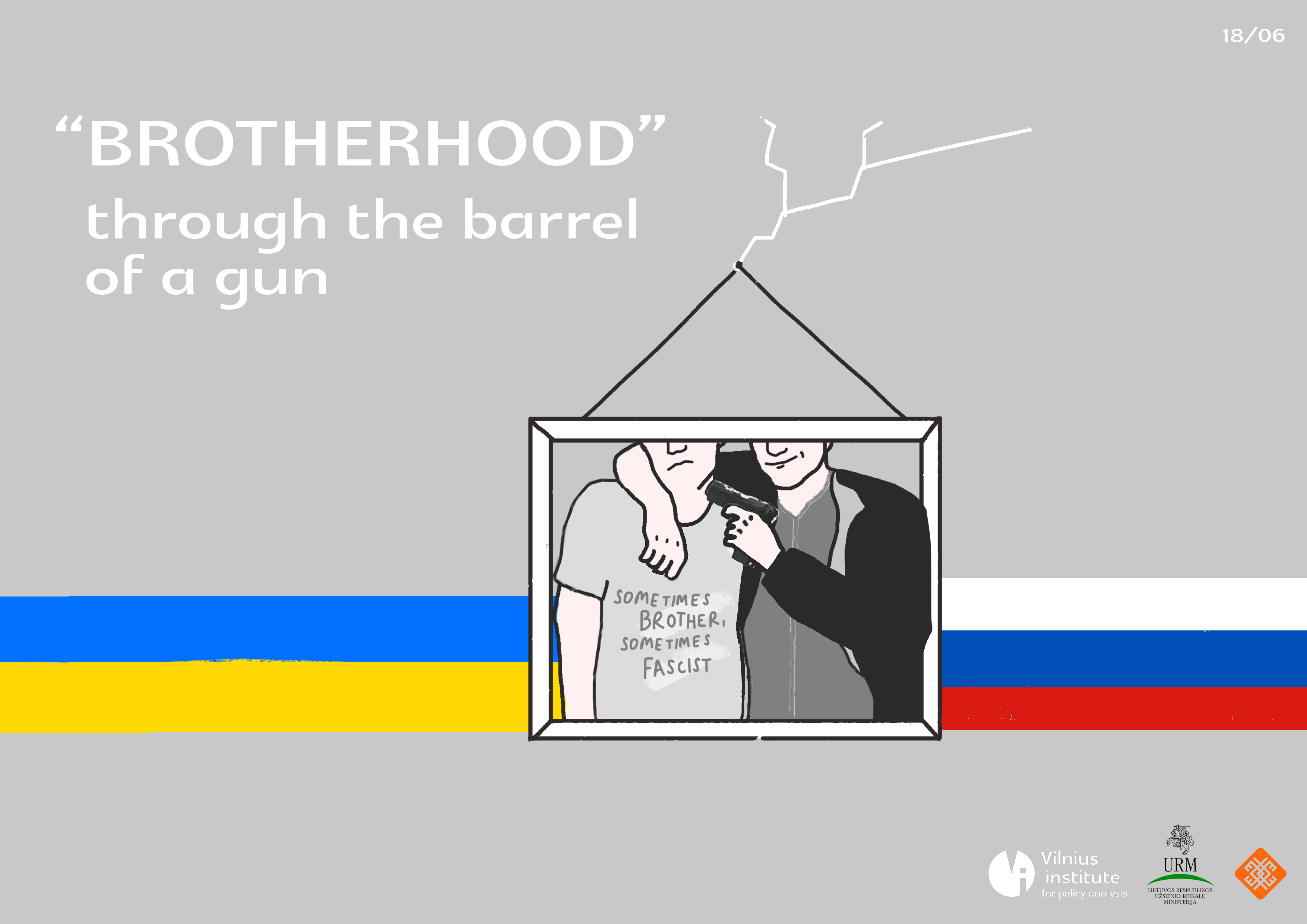
During the annual live broadcast “Direct Line“ which airs on all the biggest Russian TV channels, Russian president Vladimir Putin was asked what advice he would give to his grandchildren. Not to lie, he said. He did not, however, apply this to himself. Here we present the parts of his speech concerning the lies and disinformation about Ukraine.
- Sanctions. Putin criticized the Western sanctions on Russia which are allegedly enforced in order to bring Moscow down but are not able to do so. As it could have been expected, the president of Russia kept the actual reasons behind the sanctions regime to himself. Accordingly, they were not asked about, as it is appropriate for a carefully constructed spectacle. Putin explained that the sanctions are only intended to force the Russian economic growth, regarded by the West as unacceptable, to come to a standstill. He emphasised that there are more and more people in the West who understand the harm of the sanctions to both sides and want to normalise the bilateral relations. In this case Putin’s strategy is simple: to accuse the West of irrationality and hysterics while deliberately disguising the actual reasons behind the conflict. Western leaders are depicted as acting irrationally, as if, fearing Russia, they aim to control it. The brutal war in Ukraine, the occupation of a part of Ukraine’s territory and the annexation of Crimea remain unmentioned.
- Donbas. Another strategy is to create and amplify conspiracy theories. These work well when trying to show that everyone around is to blame, whereas Kremlin is the only side concerned about justice, peace, and law. During the live broadcast (in an interview) the commander of Donetsk People’s Republic’s armed forces Zahar Prilepin began spreading manifest disinformation. In his telling, during the World Football Championship Ukraine will initiate military actions against separatists in Russia. Putin did not miss a chance to warn that in that case Ukraine’s very statehood would be at stake and expressed Kremlin’s support for these criminal pseudorepublics which undermine the sovereignty and the territorial integrity of Ukraine. Putin also spread lies about Ukraine bombing civilians. Statements like these were exposed time and again by organizations such as “StopFake”. By creating a conspiracy theory about Kyiv’s aggressive ambitions Putin seeks to reverse the image of the war in Ukraine by implying that it is Kyiv to blame for everything and not Moscow which committed acts of aggression and occupied the territory of a sovereign country.
- Crimea. During the live broadcast V. Putin paid a lot of attention to the building of the Kerch bridge to the peninsula. He mentioned the growing numbers of tourists (which were exposed more than once) because of the bridge that was built in Crimea. He claims that the complaints about the increased prices will stop when trucks start running down the bridge to Crimea and the prices seemingly decrease. Here the president of Russia is trying to justify the annexation of Crimea with an argument of an economic nature: as long as the situation in the peninsula is improving, Russia is morally and politically right. International law and its violations are to be forgotten, following the most obvious, poorly disguised “whataboutism”. Here it is useful to remember that no amount of economic investments can turn illegal action into legal. Moreover, it is important to stress that the real economic situation in Crimea is not as pleasing. As the charity fund Maidan of Foreign Affairs reports, the number of tourists has decreased three times in the last four years. And according to the Crimean Agency of Statistics, the inflation after 2014 annexation has reached 75%. Also, the NPR correspondent in Moscow Lucian Kim stresses that the majority of Crimean locals complain about the employment deficit and significant increase of prices. Because of this, even the bribes have doubled.
- Babchenko. Of course, the case of Arkady Babchenko was also referred to during the Putin show. The president of Russia called this operation provocative and explained that the safety of all journalists and their work conditions have to be taken care of in order to allow the citizens the access to the free information. Having in mind that, according to the investigators, the order to murder A. Babchenko came from Moscow, and knowing what happened to such Russian journalists as Anna Politovskaya, Natalya Estemirova, Anastasia Baburova, it is hard to take these Putin’s words seriously. (On this issue, read more here)
- Brotherhood. During the broadcast Putin claimed that Russia and Ukraine are brotherly countries, that is, the Russian and Ukrainian nations are one and the same. Statements like these are placed in a dangerous light having in mind that in this case Moscow takes up the role of an older brother who can take care and educate his younger brother in any way it deems necessary (brutally as well). Statements about brotherhood actually disguise the imperialism, revisionism, and colonial aspirations. On the other hand, statements like these are useful for Putin because they make the reality more “poetic” and help forget the actual problems, generalizing everything with abstract insights and empty words. Finally, we can remember yet another disinformation trope which is frequently used: apparently, Ukrainians are a fascist and nationalistic nation. But then, if Russians and Ukrainians are one nation, are Russians fascists and Nazis too?
—
The text is part of a project which is aimed at strengthening democracy and civil society as well as fostering closer ties with the EU Eastern Partnership countries (Ukraine, Moldova, Georgia) by spreading independent information with the help of contemporary solutions. The project is implemented by Vilnius Institute for Policy Analysis, and is financed as part of Lithuanian Ministry of Foreign Affairs‘ Development Cooperation and Democracy Promotion Programme.




